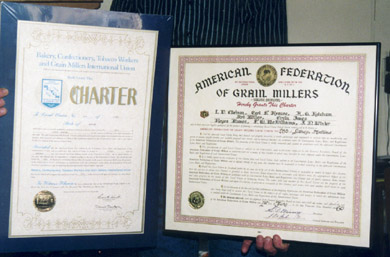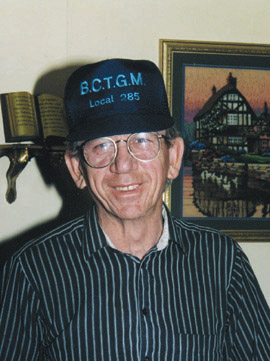|
By Lois Kerr
 Hourly wage earners at Sidney's Holly Sugar have enjoyed the benefits of a union for many years. Through the efforts of union negotiators through the years, the workers at Holly enjoy such benefits as overtime pay, a five-day workweek, and holiday pay. Today, the union local at Holly Sugar has nearly 80 year round members, and approximately 360 members during campaign. The earliest records available on union activities at Sidney's Holly Sugar covers the war years. In 1945, employees at the sugar factory belonged to Local # 21187 of the Federal Labor Union, a division of the Sugar Refinery Employees Union. Not only did the Sidney plant have an active union during the war, but the company and the union also practiced equal pay for equal work policies. The 1945 contract states that women were to receive the established rate for jobs formerly performed by men. Women in the factory during the war, however, were called "temporary" employees and as such had no seniority standing. In 1960, Sidney's Holly Sugar unionized employees joined the American Federation of Grain Millers, an international union affiliated with the AFL/CIO. The Sidney local became Local #285. The Sidney local also joined the Montana state AFL/CIO, a division of the national organization.
The Grain Millers Union served factory employees well until 1999. That year, the Grain Millers Union merged with the Bakery, Confectionery and Tobacco Workers Union. The new union, Bakery, Confectionery, Tobacco Workers and Grain Millers, (BCTGM), now has 160,000 members. Deming says, "The Grain Millers Union was declining in membership. With this merger, one union now covers all employees from the raw materials to the finished product." Deming feels the merger will better serve its combined membership. "There's strength in numbers," he points out. "Also, we'll receive more and better training in labor issues." Deming explains that company and labor issues are more complex now than they were years ago. "There are so many laws governing both unions and companies," he explains. "Complexity has become a way of life." Many people question Deming as to the relevance of a labor union at the Sidney factory. "Unions obtained for their membership a 40-hour work week, a 5-day work week, overtime, holiday pay, safe working conditions," he comments. "All of this is thanks to unions. If workers have a problem, they can go to a union representative who will approach management on their behalf. We have mediation teams that handle problems." He continues, "So many people take these benefits for granted. They don't have to worry about job call-backs, job rights, seniority. These benefits were all negotiated for them, thanks to the unions." The union works closely with factory management on issues of mutual concern at the Sidney plant. Safety is an important issue for everyone. "The more we save on safety, the better it is for both company and union," Deming remarks. "Lost time accidents cost a lot of money and cause a lot hardships." The union and the company work together on job training. Deming points out that union personnel at the Sidney factory are multi-talented and very diversified. "Panel operators are not just panel operators," he says. "Skill levels among workers increase every year. The company and the union work together to provide on-the-job training, and our workers are not restricted to one particular job. If someone wants to learn a different trade, and he or she fits the program, that person is free to learn the new trade." He adds, "These days, people have to be multi-talented to keep jobs, especially in a processing plant." Deming also hopes to see the union play a larger role with company management on sugar legislation in Washington. "Our union will have to get more involved with the legislative process," Deming states. "Adverse legislation for the sugar industry affects us all." Deming also believes the union must become more heavily involved on cost saving methods of operation within the factory. "If we operate at a loss, this means our jobs," Deming says. "We need to remain involved in cost saving techniques, and we need to keep abreast of plant operations." As well as operating as a union local, and working with management on issues of mutual concern, the Sidney local also belongs to the Rocky Mountain Inter-factory Council, an organization composed of negotiating team members from the Worland, Torrington, Hereford, and Sidney plants. This council meets once a year. Sidney union delegates also join in an inter-union conference, which involves all locals from all Imperial Sugar Corporation factories. As union president, Deming has a lot of responsibility. He has just begun his second three-year term as president of the Sidney local. Deming has been active in the union for the past 25 of the 28 years he's worked at Holly Sugar. He spent 12 years serving as financial secretary, and has held a variety of union offices. "I'm a problem solver," he says. "I like helping other people, and involvement in the union is one way to help." The union presidency has its drawbacks, however, "It takes a tremendous amount of time and commitment,' Deming advises. "Negotiation years are especially tough, because there is a lot of out of town traveling involved, with a lot of time spent away from home. It isn't an easy job." He adds, "I couldn't do it without the support of my wife." Besides participation in the negotiation process, the union president heads every union committee. He chairs the local meetings, held once a month. He communicates with the international representative of the union, attends inter-factory meetings, participates in educational seminars, "and the phone rings off the hook," he jokes. Deming also acts as the main spokesperson between the union and the company. The Sidney Local 285G does its share to maintain good relations in the community. The Local offers two $500 scholarships every year for qualifying seniors, paid for out of union dues. Seniors applying for the scholarships write an essay on a topic related to labor unions. A committee selects the winning two essays. "Students need not be from a union family to win a scholarship," Deming says. "They don't have to be from an agricultural background, either. These scholarships are open to all Richland County high school seniors." The local also has sponsored a summer T-ball team, held fund raisers for accident victims and those in need of hospital care, helped with raffle tickets and will sponsor the Little Britches Rodeo this year. |
 Mark
Deming, current Sidney Holly Sugar union president, explains, "The Grain
Millers Union helped with negotiations, labor problems, settling contracts
and provided guidelines and education. The state AFL/CIO acts more as a
political arm, and gives its membership education and support on labor
relations."
Mark
Deming, current Sidney Holly Sugar union president, explains, "The Grain
Millers Union helped with negotiations, labor problems, settling contracts
and provided guidelines and education. The state AFL/CIO acts more as a
political arm, and gives its membership education and support on labor
relations."